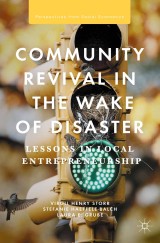Details

Community Revival in the Wake of Disaster
Lessons in Local EntrepreneurshipPerspectives from Social Economics
|
96,29 € |
|
| Verlag: | Palgrave Macmillan |
| Format: | |
| Veröffentl.: | 10.02.2016 |
| ISBN/EAN: | 9781137314895 |
| Sprache: | englisch |
| Anzahl Seiten: | 208 |
Dieses eBook enthält ein Wasserzeichen.
Beschreibungen
Rebounding after disasters like tsunamis, hurricanes, earthquakes, and floods can be daunting. Communities must have residents who can not only gain access to the resources that they need to rebuild but who can also overcome the collective action problem that characterizes post-disaster relief efforts. Community Revival in the Wake of Disaster argues that entrepreneurs, conceived broadly as individuals who recognize and act on opportunities to promote social change, fill this critical role. Using examples of recovery efforts following Hurricane Katrina in New Orleans, Louisiana, and Hurricane Sandy on the Rockaway Peninsula in New York, the authors demonstrate how entrepreneurs promote community recovery by providing necessary goods and services, restoring and replacing disrupted social networks, and signaling that community rebound is likely and, in fact, underway. They argue that creating space for entrepreneurs to act after disasters is essential for promoting recovery and fosteringresilient communities.
1. Introduction<br>2. The Entrepreneur as a Driver of Social Change<br>3. How Entrepreneurs Promote Post-Disaster Community Rebound<br>4. How Entrepreneurship Promotes Community Recovery: The Cases of Hurricanes Katrina and Sandy<br>5. Goods and Services Providers<br>6. Regrowing Uprooted Social Networks<br>7. Entrepreneurs as Signals of Healthy Community Rebound<br>8. Fostering Resilient Communities<br>9. Conclusion
Virgil Henry Storr is Senior Research Fellow and Director of Graduate Student Programs at the Mercatus Center at George Mason University, USA, and Research Professor of Economics in the Department of Economics at George Mason University. Storr is the author of <i>Understanding the Culture of Markets</i>, and his research on community recovery after disaster has been published in <i>Rationality & Society</i>, the <i>Review of Social Economy</i>, <i>Public Choice</i>, the <i>Journal of Urban Affairs</i>, and the <i>Review of Austrian Economics</i>. Born and raised in the Bahamas, Storr now lives in Manassas, Virginia, with his wife, Nona, and daughter, Winnie.<br><br> Stefanie Haeffele-Balch is Associate Director of Graduate Student Programs at the Mercatus Center at George Mason University, USA. She is also a PhD Student in the Economics Department at George Mason University. An alumna of the Mercatus Center MA Fellowship and the Presidential Management Fellowship, her work and researchexperience has focused on post-disaster community recovery as well as the political economy of nonprofit organizations, specifically focusing on organizations that attempt to provide affordable housing to the poor.<br><br> Laura E. Grube is Mercatus Dissertation Fellow and PhD candidate in Economics at George Mason University, USA, and Visiting Instructor in the Economics Department at Beloit College, USA. Her research focuses on post-disaster economic development and the systems of self-governance that enable individuals and communities to overcome challenges during mundane times and following disaster.
<p>"Too often we look only to the government to help with disaster recovery when, as this excellent book reveals, the answer is already right in front of us. Using hundreds of interviews and months in the field after Hurricane Katrina and Hurricane Sandy, the authors skillfully show us how entrepreneurs and local business people serve as change agents after crisis." - Daniel P. Aldrich, Professor of Political Science, University Faculty Scholar, and Director of Asian Studies, Purdue University, USA; author of Building Resilience: Social Capital in Post-Disaster Recovery</p>"Community Revival in the Wake of Disaster focuses attention on the role that economic as well as social entrepreneurs may play in promoting community recovery and fostering resiliency. The case studies included in the book are compelling, and the broader lessons regarding the potential for social change in the wake of disaster are important." - Lori Peek, Associate Professor of Sociology and Co-Director of the Center for Disaster and Risk Analysis, Colorado State University, USA; co-author of Children of Katrina<p></p><p>"Storr, Haeffele-Balch, and Grube take a critical and rejuvenating approach to the meaning of 'entrepreneur'. This book describes how post-disaster communities can make a comeback through collective return and renewal. As a retired fire marshal, I want this book in the hands of every community stakeholder. As an educator, I think it belongs in the hands of every student involved in becoming his or her community's future." - Rodger E. Broomé, Assistant Professor, Department of Emergency Services, Utah Valley University, USA; Retired Battalion Chief and City Fire Marshal, West Jordan Fire Department, Utah, USA</p>"Having spent hundreds of hours interviewing New Orleans and Gulf Coast residents in the aftermath of Hurricane Katrina, my fellow researchers and I have been repeatedly struck by the scale and scope of the challenges disaster victims must overcome as they attempt to rebuild their homes and their communities. In Community Revival in the Wake of Disaster, Storr, Haeffele-Balch, and Grube demonstrate vividly and compellingly how entrepreneurs across all sectors drive community recovery by providing necessary resources and coordinating recovery efforts. Scholars, students, and practitioners who are interested in how communities can rebound in the wake of disaster and how policymakers can promote resilient communities should read this book." - Emily Chamlee-Wright, Provost and Dean, Washington College, USA; author of The Cultural and Political Economy of Recovery: Social Learning in a Post-Disaster Environment<p></p>"When disaster strikes a community, the natural instinct of those who want to assist in the recovery process is that 'we must do something,' which usually translates into a bureaucratic effort to centrally plan the recovery. However, in this book, the authors put forth a compelling case for decentralizing recovery efforts and allowing space forentrepreneurial activity to take place in the wake of a disaster. Storr, Haeffele-Balch, and Grube effectively argue that it is entrepreneurship that leads to a more robust and long-term recovery for the community affected by the disaster. This work is an important step in the process toward understanding the role that individuals and informal institutions play in post-disaster community recovery." - Peter J. Boettke, University Professor of Economics and Philosophy, George Mason University, USA<p></p>

















